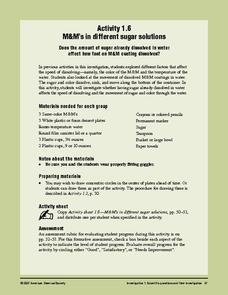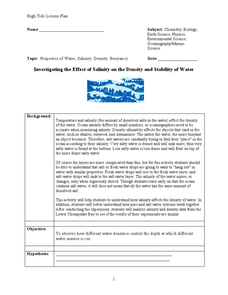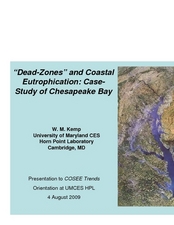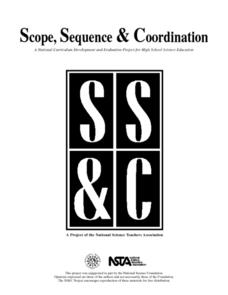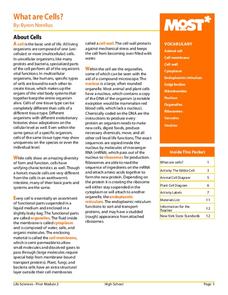Curated OER
Science: Dissolved Oxygen and Water Quality Sampling
Students perform tests to determine the level of oxygen dissolved in water. After examining a table displaying the temperature and solubility of water, they examine the three stages involved in the test. Upon completion, students explain...
Curated OER
All Mixed Up!
What happens when solids are added to liquids? After reading an informative paragraph about solutions, learners answer six true/false questions regarding solutions, and what substances will dissolve into liquids they are mixed with. A...
American Chemical Society
M&M's in Different Sugar Solutions
To conclude a mini unit on the dissolving of M&Ms® candy coating, this activity investigates whether or not the concentration of sugar in the solvent affects the dissolving rate. Consider having older science learners write their own...
Curated OER
Investigating the Effect of Salinity on the Density and Stability of Water
Water with varying amounts of dissolved salt are dyed and then used to compare densities. The objective is to discover the effect of salinity, and therefore density, on ocean water on the stability of the ocean. Many branches of science...
National Institute of Open Schooling
Solutions
Aqua regia, or royal water in Latin, is a solvent that can dissolve solid gold and platinum into a solution. Activity nine in a series of 36 allows classes to learn, through readings and answering questions, what a solution is and the...
Curated OER
How Soluble Is It?
Is sugar more soluble than salt? Experiment with water and solubility with an elementary science activity. After interpreting data from a bar chart, fifth graders use different types of sugar to determine if the size of sugar particles...
Chymist
Determination of the Volume of CO2 in Pop Rocks
Where does the pop in pop rocks come from? An engaging activity asks scholars to measure the amount of carbon dioxide in a package of Pop Rocks candy. Learners dissolve the candy in water and use the solubility of CO2 to determine its mass.
Curated OER
#24 How Much Air Is In Foamed Polystyrene Products?
Students are challenged to come up with a good estimate of the amount of air in foamed polystyrene products. They use this gas evolution experiment and as such have students measure the gas generated when foamed polystyrene is degassed...
Curated OER
"Dead-Zones" and Coastal Eutrophication: Case-Study of Chesapeake Bay
Take an in-depth look at nutrient loading, eutrophication, and hypoxia using data on The Chesapeake Bay as an example. This comprehensive presentation includes detailed graphs, photos, and details about the changes in marine organism...
American Chemical Society
Entropy and Enthalpy Changes
My room isn't messy — it's a scientific experiment in entropy! Scholars investigate entropy, enthalpy, and spontaneity through a guided procedure and set of questions. The lesson connects the Second Law of Thermodynamics, energy transfer...
NOAA
Ocean Layers II
Now that you know the ocean has layers, let's name them. The seventh installment of a 23-part NOAA Enrichment in Marine sciences and Oceanography (NEMO) program covers terminology associated with ocean layers, such as thermocline and...
Curated OER
Oils and Plastic
Peruse the properties of polymers with your materials engineers, chemistry aces, or emerging ecologists. The inquiries in this resource include puncturing polyethylene plastic bags, dissolving polystyrene cups, creating a polymer ball...
Curated OER
What Are Cells?
Energize the cells of young biologists with an edible life science activity. Engaging learners in exploring the inner workings of plant and animal cells, this activity involves using colored jello and various sweet and tasty treats to...
Curated OER
Factors that Affect Reaction Rates
Collaborating chemistry pupils observe that temperatrue increases the movement of dye throughout water, stirring increases the dissolving rate of sugar cubes, and concentration of solutions increases the chemical reaction rates. These...
Curated OER
Water Alchemy
After reading "Aquatic Alchemy," an article about recapturing water for reuse when in space, your class will use calcium hydroxide or hydrated lime to purify cloudy water. Geared toward high school chemistry or environmental science...
Curated OER
Gelatin Volcanoes
Students investigate magma flow using gelatin volcano models. In this earth science lesson, students sketch the magma bodies as observed from the top of their model. They explain why magma moves that way.
Curated OER
Lake Strata and Internal Waves
Use the classic density demonstration of placing a cola, a clear soda, and a diet soda into a tank of water. Then let learners attempt to pour some of the soda into layers in a clear container. The procedure explains a thermocline, and...
Curated OER
Titration: Standardization of a Base and Analysis of Stomach Antacid Tablets
Titration experiments don't have to give your high schoolers a stomachache. Study the ways to titrate an acide with a base in an engaging science experiment, which involves creating solutions and performing titrations. Pupils prepare a...
Royal Society of Chemistry
Chemistry Masterclass—Chemistry Outreach
Immerse your chemistry class in the world of organic chemistry! Science scholars isolate acetaminophen from an over-the-counter sample during an intense and interesting lab. Groups use many different separation and analysis techniques to...
Kenan Fellows
Sustainability: Learning for a Lifetime – The Importance of Water
Water is essential for life—and understanding the importance of clean drinking water is essential in understanding sustainability! Show your environmental science class the basics of water testing and treatment through a week-long...
Curated OER
Review of Ionic and Covalent Compounds and Transitioning from Ionic to Covalent Compounds
Here is a unique assigment: compare and contrast ionic and covalent compounds in an extensive data table and then analyze Lewis dot structures in antoher. Three columns are to befilled in: "characteristic or feature," "applies to ionic...
Science-Class.net
Rock Candy Crystals
Candy is one of my favorite words, and it's an even better word when it relates to science. Yes, candy science can happen when you grow rock candy crystals with your class. The entire process for growing these edible wonders of nature is...
Curated OER
Introduction to Dissolved Oxygen and Demonstration of a Simple Test Procedure
Young scholars explain the importance of dissolved oxygen in water ecosystems. They describe the aquatic oxygen cycle and the effect of water pollution on oxygen. They make observations, collect data and draw a conclusion.
Curated OER
Outcomes Science 4
In this outcome science 4 worksheet, students apply scientific knowledge to answer and calculate a variety of questions. Students research the answer to several questions using the websites suggested.




